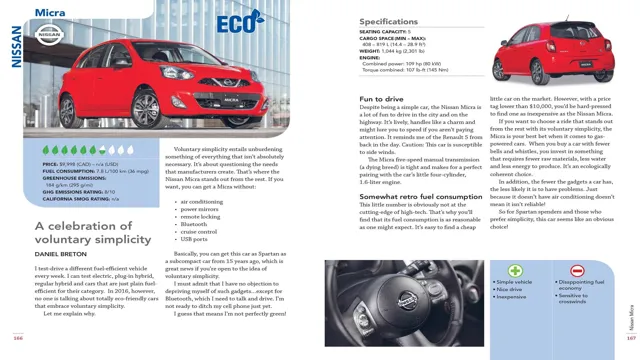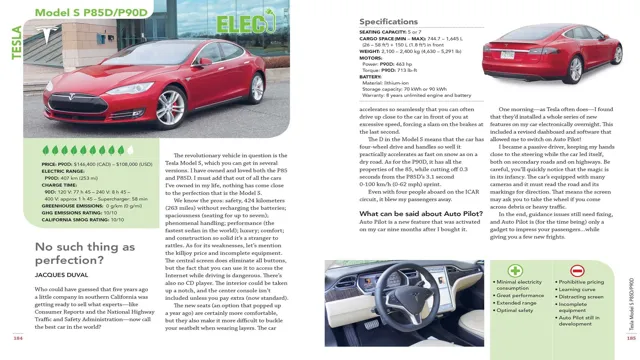The Ultimate Guide to Saving Money on Fuel: Electric, Hybrid, and Fuel-Efficient Cars Explained
Do you want to save money on gas and reduce your carbon footprint? Electric and hybrid vehicles may be just what you’re looking for. These efficient cars are becoming increasingly popular, and for good reason. They offer eco-friendly alternatives to traditional gas-powered vehicles and can save you money in the long run.
Electric cars run completely on electricity, while hybrid cars use a combination of electricity and gas. Both types of vehicles have advanced batteries that allow them to store and reuse energy. This means that they can go further on a single charge and require less fuel overall.
In this guide, we’ll explore the benefits of electric and hybrid cars, compare their differences, and provide you with some useful tips for maintaining and owning one. We’ll also take a look at some of the best models on the market and help you navigate the process of purchasing an energy-efficient vehicle. Whether you’re a long-time environmentalist or just looking to save some money at the pump, this guide is for you.
By the end, you’ll have a better understanding of electric and hybrid cars and be well-equipped to make an informed decision about your next vehicle purchase.
Electric Cars vs Hybrid Cars
When it comes to choosing between electric cars and hybrid cars, there are a few key differences to consider. Electric cars are fully powered by electricity, which means they need to be charged regularly and may have a limited range. On the other hand, hybrid cars have both an electric motor and a gasoline engine, which means they can switch between the two power sources as needed to optimize fuel efficiency.
Ultimately, the choice between an electric car and a hybrid car will depend on your driving habits and needs. If you have a short commute and do mostly city driving, an electric car might be a good choice. But if you frequently take long trips or need to drive in areas without charging stations, a hybrid car might be a better fit.
And if you’re looking to reduce your carbon footprint and save money at the gas pump, either option is a great way to do so. Whether you go electric, hybrid, or stick with a traditional gas-powered car, there are plenty of fuel-efficient options out there to suit your needs.
Key Differences and Similarities
Electric cars and hybrid cars are slowly gaining popularity among car buyers, but what is the difference between the two? The key difference lies in their power source. Electric cars rely solely on electricity to power their engine, which means they need to be charged frequently, whereas hybrid cars use both electricity and gas, which allows them to go longer distances without needing a charge. Another similarity is that both types of cars are environmentally friendly and produce fewer emissions compared to traditional gasoline-powered cars.
However, electric cars tend to be a bit more expensive than hybrids due to their all-electric components. Ultimately, the choice between the two comes down to personal preference and lifestyle, with electrics being better for urban environments and short commutes, while hybrids are better for long hauls and frequent road trips.

Pros and Cons of Each
Electric cars and hybrid cars are both eco-friendly alternatives to traditional gas-guzzling vehicles. Electric cars run solely on electricity and need to be charged regularly, whereas hybrid cars run on a combination of electricity and gasoline. One advantage of electric cars is that they produce zero emissions, making them better for the environment.
Additionally, they tend to have lower operating costs since electricity is cheaper than gas. On the other hand, electric cars have limited driving range and can take a significant amount of time to charge. Hybrid cars, on the other hand, offer the convenience of gasoline as a backup for longer trips, but still reduce emissions and improve fuel economy.
However, they tend to be more expensive than traditional gas cars due to their advanced technology. Ultimately, the decision between an electric car and a hybrid car depends on personal preferences and priorities such as long-term cost savings, environmental impact, and driving habits.
Fuel Efficiency Ratings
If you’re in the market for a new car and are concerned with fuel efficiency, then you’ll want to pay attention to the fuel efficiency ratings of different vehicles. These ratings are measured in miles per gallon (mpg) and vary depending on the type of car you’re looking at. For electric and hybrid cars, fuel efficiency can be measured in miles per kilowatt-hour (kWh) as well.
Essentially, the higher the fuel efficiency rating, the less gas or electricity the car will need to travel the same distance. A car with a high fuel efficiency rating can save you money at the pump and help reduce your impact on the environment. When looking at different cars, it’s important to compare their fuel efficiency ratings to get a sense of how they stack up against each other.
The guide to electric hybrid and fuel efficient cars is a great resource to help you make an informed decision on which vehicle is right for you.
Understanding Miles per Gallon (MPG)
When it comes to assessing the fuel efficiency of your vehicle, the miles per gallon (MPG) rating is a crucial factor to consider. MPG refers to the distance traveled per gallon of fuel consumed, and it’s an important measure of the amount of fuel your car uses. The higher the MPG, the more fuel-efficient your car is, and the less money you’ll need to spend on fuel.
Fuel efficiency ratings are an essential consideration when buying a car, especially if you’re looking to reduce transport costs. However, it’s important to note that various factors can impact MPG, such as your driving habits and road conditions. Therefore, it’s essential to consider your driving style and routes when interpreting your car’s MPG rating.
Overall, understanding MPG is crucial for reducing your fuel costs and emission footprint.
How to Compare Cars’ Efficiency Ratings
Comparing the fuel efficiency ratings of different cars can be confusing due to the variety of metrics used. The most common rating is miles per gallon (MPG), which measures how many miles a car can travel on a gallon of gasoline. However, there are other ratings such as liters per 100 kilometers (L/100km) and kilometers per liter (km/L) that are used in different parts of the world.
To accurately compare cars, it’s important to use a consistent measurement. Additionally, keep in mind that the fuel efficiency rating provided by a car manufacturer may be different than the actual rating achieved by the driver due to individual driving habits and conditions. Comparing cars’ efficiency ratings can help save money on gas and reduce environmental impact, so taking the time to research and compare can be well worth it.
Top Fuel Efficient Cars of the Year
When it comes to choosing a car, many drivers are focused on finding the most fuel-efficient option. That’s where fuel efficiency ratings come into play. These ratings show just how efficient a car is in terms of fuel consumption, measured in miles per gallon (mpg).
Some of the top fuel-efficient cars of the year include the Toyota Prius Prime, Hyundai Ioniq, and Honda Insight. These cars not only offer impressive gas mileage, but they also come equipped with various eco-friendly features, such as hybrid or electric engines. With rising fuel costs and growing concern for the environment, finding a fuel-efficient car is more important than ever.
By prioritizing fuel efficiency ratings, you can save money on gas while also reducing your carbon footprint.
Tips for Maximizing Your Car’s Efficiency
If you’re looking to maximize your car’s efficiency and save on fuel costs, there are a few things you can do. First, consider investing in an electric hybrid or fuel-efficient car. These vehicles are designed to use less fuel and emit fewer emissions compared to traditional gas-powered cars.
Plus, they often come with features like regenerative braking and automatic stop-start systems that can further reduce fuel consumption. Another way to increase your car’s efficiency is to regularly maintain it. This includes keeping your tires inflated to the recommended pressure, changing your oil and air filters as needed, and ensuring your engine is running smoothly.
Finally, consider adjusting your driving habits. Avoid aggressive acceleration and braking, as this can waste fuel. Instead, try to maintain a steady speed and anticipate traffic ahead.
With these tips, you can make the most out of your car and enjoy the benefits of a more efficient ride.
Driving Habits to Adopt or Avoid
When it comes to maximizing your car’s efficiency, there are a few driving habits you should adopt. First off, try to avoid sudden accelerations and hard braking. These habits can cause unnecessary wear and tear on your vehicle, as well as wasting fuel.
Instead, try to move smoothly and keep a consistent speed. Additionally, using cruise control on the highway can make a big difference in your car’s fuel efficiency. Another tip is to avoid idling whenever possible.
If you’re parked and waiting for someone, turn off your engine to save fuel. Finally, make sure you keep up with regular maintenance and tune-ups. Keeping your tires properly inflated, using the recommended grade of motor oil, and replacing air filters when needed can all help boost your car’s efficiency and save you money in the long run.
By incorporating these habits, you can ensure that your car is running at its best and getting the most out of every gallon of gas.
Maintenance Tips to Improve Efficiency
Maintaining your vehicle is crucial if you want to improve efficiency and keep it running smoothly. One of the best ways to do this is by regularly checking and changing the oil. Dirty oil can cause your engine to work harder, reducing fuel efficiency.
You should also keep your tires properly inflated as low pressure can increase resistance and waste gas. Another maintenance tip is to replace your air filter as a clogged one can decrease airflow and cause your engine to use more gas. Additionally, make sure to schedule regular tune-ups to keep your car running at its best.
All of these simple maintenance tips can help maximize your car’s efficiency and save you money on gas in the long run.
Benefits of Driving an Efficient Car
If you’re considering buying a new car, there are many benefits to consider when it comes to choosing an electric hybrid or fuel-efficient vehicle. Not only do these cars help reduce your carbon footprint, but they’ll also save you money in the long run. By using less fuel, you’ll be spending less money at the gas pump, and you may even be eligible for tax credits or other incentives.
Efficient cars also tend to have lower maintenance costs because they have fewer moving parts. Plus, with advances in technology, electric and hybrid cars are becoming more affordable and accessible for consumers. In short, whether you’re looking to save money, reduce your environmental impact, or simply enjoy the latest technology, electric hybrid and fuel-efficient cars are worth considering.
Conclusion
In conclusion, the world of automobiles is rapidly changing, and electric hybrid and fuel-efficient cars are leading the way towards a greener future. These innovative vehicles not only reduce emissions and help preserve our planet, but they also provide a smooth and efficient driving experience. And let’s not forget the money you’ll save on gas! So whether you’re a tree-hugging environmentalist or just looking for a practical and stylish way to get around town, electric hybrid and fuel-efficient cars are the way to go.
So why not join the revolution and get a little “charge” out of your daily commute?
FAQs
What is an electric hybrid car?
An electric hybrid car runs on both an electric motor and a gasoline engine, allowing for improved fuel efficiency.
How do electric hybrid cars work?
Electric hybrid cars use regenerative braking and the electric motor for low speed driving, and switch to the gasoline engine for high speed and longer distance driving.
How do fuel efficient cars save money?
Fuel efficient cars utilize technologies such as smaller engines, aerodynamic designs, and hybrid systems to achieve higher fuel economy, leading to lower fuel costs for drivers.
What is the difference between a hybrid car and a plug-in hybrid car?
A plug-in hybrid car can be recharged by plugging it into an electrical outlet, while a regular hybrid relies on the gasoline engine and regenerative braking to recharge its battery.




